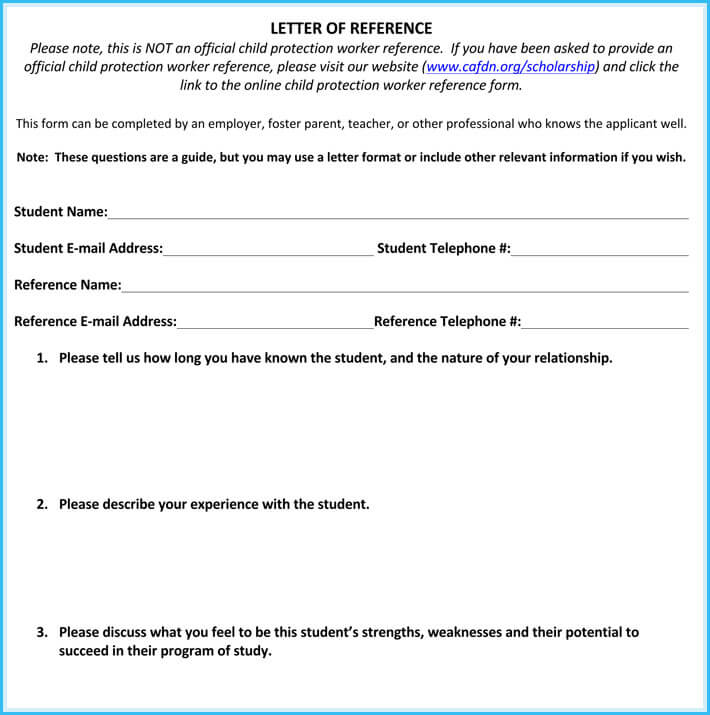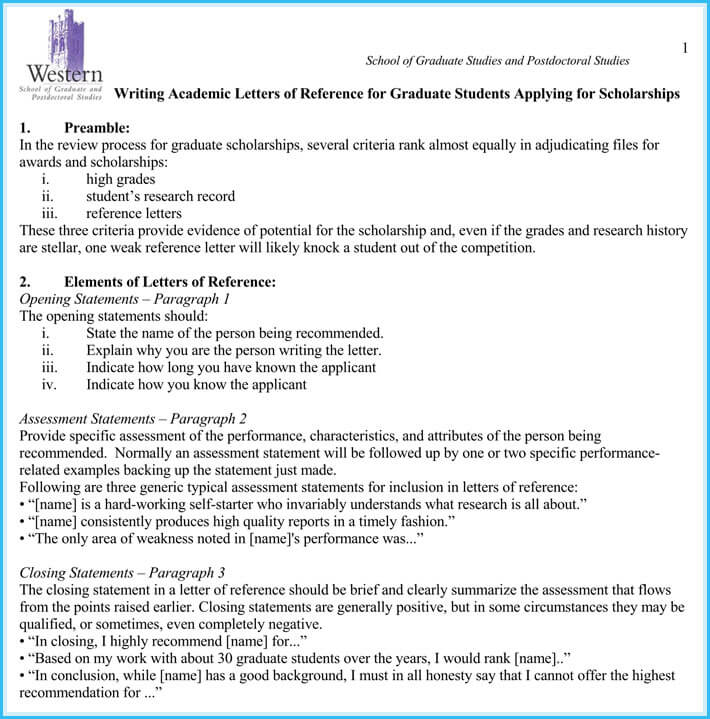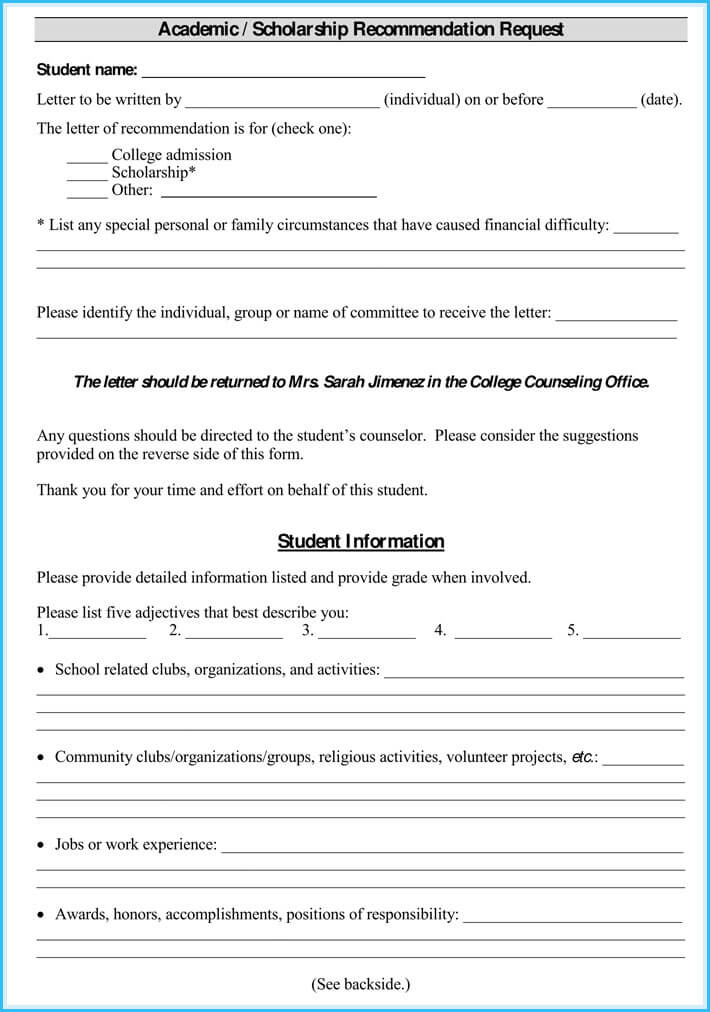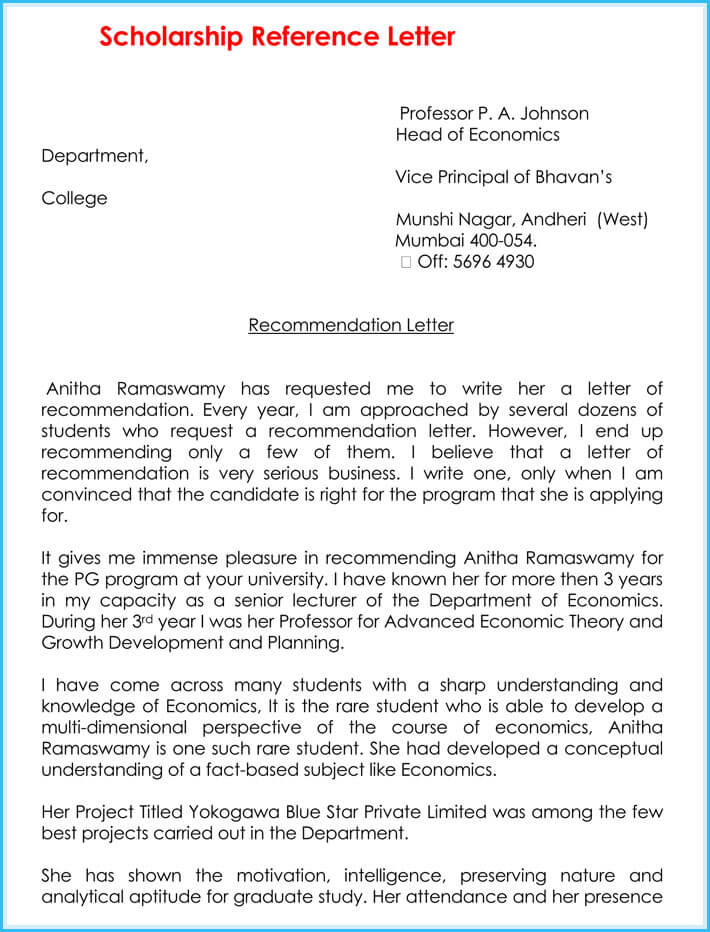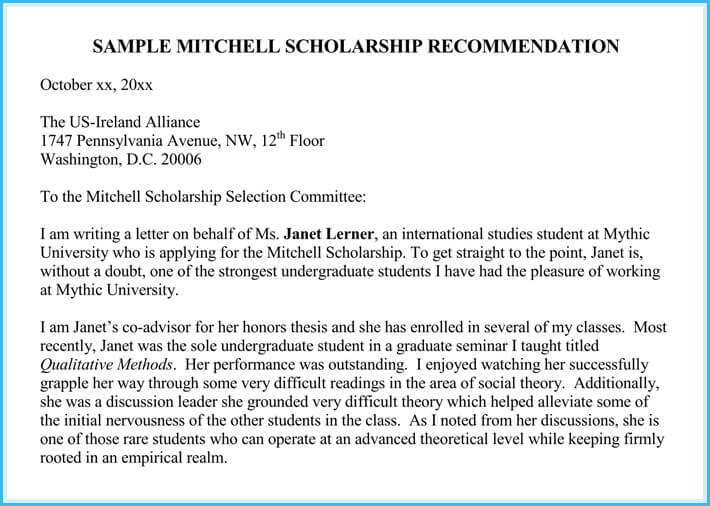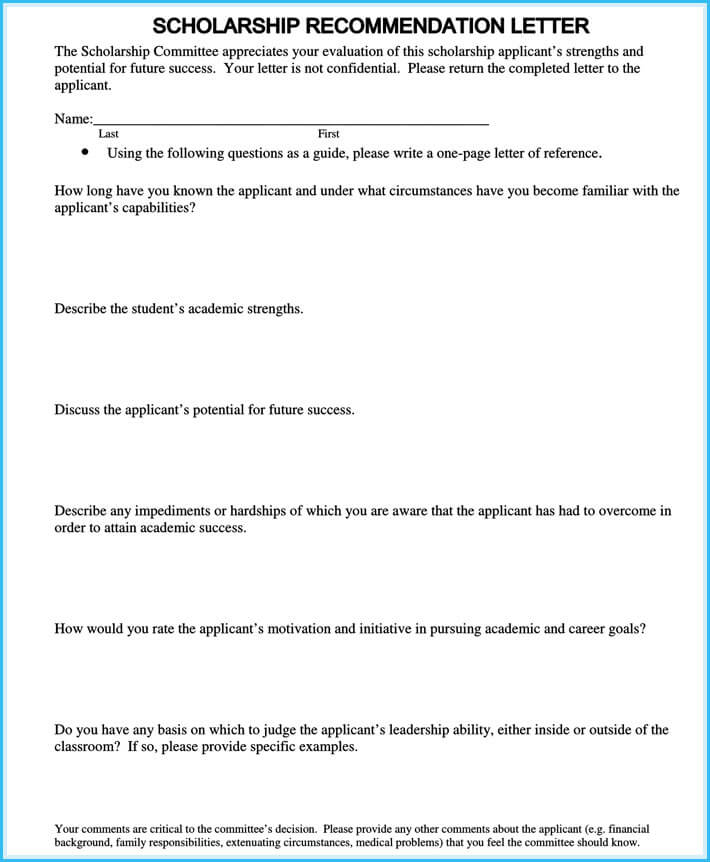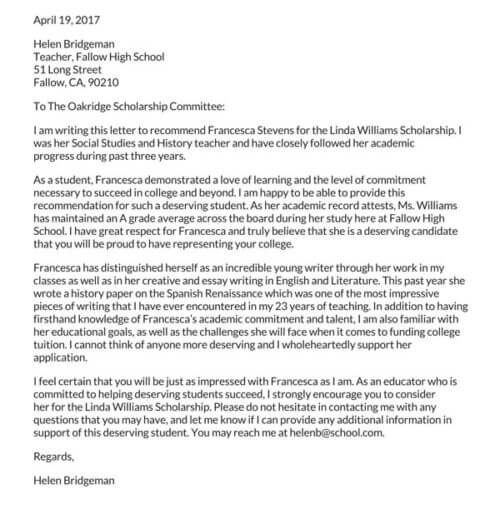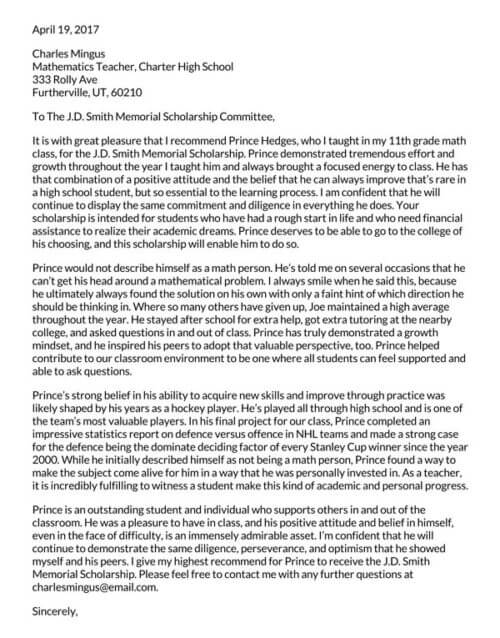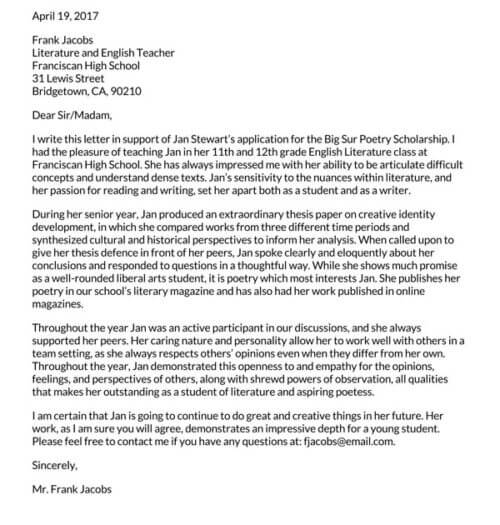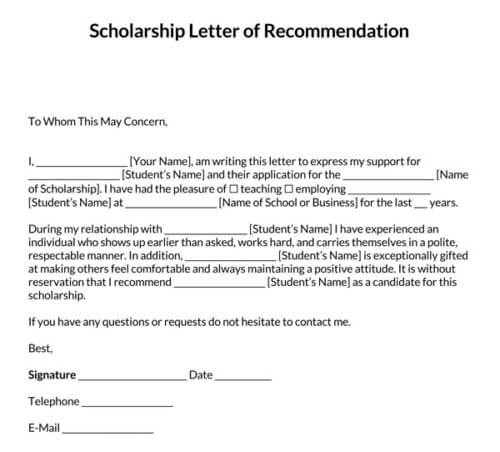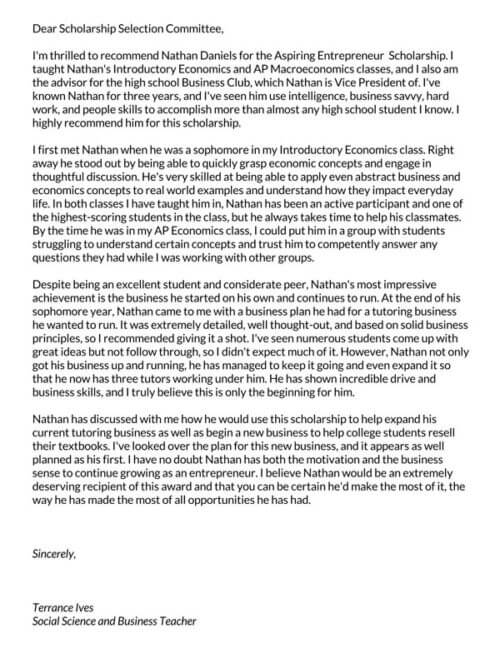According to Jessica Marinaccio, Dean of Undergraduate Admissions and Financial Aid at Columbia University, scholarship recommendations or reference letters are important to the admission process and to a student getting a scholarship.
A letter of recommendation for a scholarship, also known as a scholarship reference letter, contains information concerning a particular student’s achievements, character traits, and qualities that match the criteria of a chosen scholarship.
The recommender, in this case, must be an adult who is familiar with the student, like a teacher, professor, or even a counselor.
The recommender should always be aware of the scholarship requirements before writing this letter. It must fulfill these requirements specifically; they should match the terms of reference of the award.
As the recommender, being aware of the guidelines of the scholarship will make it easier to write it properly to help the student qualify for the scholarship
Free Templates
Benefits of Scholarship Recommendation Letter
There are benefits to including it in scholarship applications. It will help to accomplish various things when included in a student’s scholarship application. The purpose of using it is discussed as follows:
Acts as a strong endorsement for a student
This letter acts as a reinforcing tool for the student by showing that the recommender approves of the student getting the scholarship.
Also, it addresses the student’s future intentions in a confident manner, which proves how “worthy” they are for the scholarship. It helps to bring a student’s résumé to life and shows that they are so focused that there are people willing to help them achieve their dream by helping them qualify for the scholarship.
Serves as evidence of a student’s commitment and goals
A student might be aiming to study engineering, literary studies, or medicine. They might also be looking for a way to further their athletic prowess. Therefore, this letter will act as evidence of a student’s commitment and goals; hence, increasing their chance of getting the scholarship to achieve either their academic or athletic commitment.
Attests to the student’s eligibility for the scholarship
Since such letters are customized to fit the award of a specific scholarship, it helps to corroborate why the student deserves the scholarship. The letter highlights the merits or the needs that the students may have that make them qualified for the scholarship.
For instance, if a student is looking for a scholarship based on their financial needs; then, this letter can indicate how the student can still work well and achieve their dreams even with limited resources.
Prewriting Consideration
There are tips and considerations that a recommender should keep in mind before agreeing to write it for a scholarship. Here are some of the prewriting considerations:
Either ready or not
As a recommender, one must consider their ability to construct a powerful letter for the student. This can only be achieved if they know the student well. If this is not the case, failure to write the letter genuinely might hurt the student and even cost them the scholarship. The letter might come off as uninformed, not confident, and not enthusiastic.
Have the complete information
The recommender should find out these details from the student. The scholarship could be awarded to those students who can overcome challenges, those who have great academics, those with excellent athletic merits, or students in a particular field of study. The student can provide this information in an interview or alongside their résumé.
The recommender will also be able to learn more about the student’s experiences for a better-crafted letter. With this information, the recommender can write a powerful letter of recommendation that follows the terms of reference of the award.
Check the guidelines
With these scholarship guidelines in mind, the recommender can correctly validate the student for the scholarship by providing the correct examples.
For instance, if the scholarship awards a student with technology studies, the recommender can write about the student’s innovation in technology.
Have the story to be told in mind
A powerful reference letter for a scholarship is one that tells a story about the candidate. The narration of the student’s strengths and other important experiences will help them stand a chance at getting the scholarship. The things, challenges, and obstacles that have shaped the student
Writing a Scholarship Recommendation Letter
It should be about one page long. Here is how to write it:
Letterhead
The letterhead is written at the top-left corner of the page. It should contain the following details: date (when the writing happened), the recommender’s full name, the recommender’s title, the school name, street address, and information on the city, state & zip code.
Body paragraphs
A recommender must have two to three body paragraphs that highlight the student’s abilities and vouch for their eligibility when it comes to the scholarship.
Introduction
The introduction paragraph should be brief and precise. It should be about two to three sentences long. It should introduce the applicant, state the chosen scholarship that they are applying for, and describe the nature of the relationship between the recommender and the student.
EXAMPLE
To Whom It May Concern or Dear Admissions Committee:
I am writing this letter to recommend {Applicant’s Name} for the {Name of the Scholarship Program}. As his professor (nature of the relationship), I have worked closely with {Name of Applicant} for about 6 years (length of the relationship). I believe that he is a remarkable and promising student whom I can comfortably recommend for these scholarship to pursue his dream of studying medicine.
Experience with student
This body paragraph is the most important in the letter. The committee dealing with awarding scholarships will be interested in knowing how the student works with others. That means that this kind of information is essential and should be added to the letter. The recommender can highlight some meaningful events that happened concerning the student.
The experience the recommender has with the student helps the committee understand them better.
EXAMPLE
I believe that (Name of Applicant) deserves the scholarship program since she is a dedicated leader who is very passionate about bringing change to the community. Last year, she planned and hosted a Talent Show to help raise money for students who have cancer.
Student’s potential
As the recommender, there is a need to mention and describe the potential of the student so as to help them achieve the scholarship. The recommender should list the student’s potential in terms of their academic performance and strengths.
A recommender can highlight these potentials in a way that shows how the student still succeeds even when dealing with challenges. Information about the student’s potential will make the committee see that the recommender actually believes in the student.
EXAMPLE
In her senior year, (Name of Applicant) produced an amazing thesis paper in biology that helped her get an excellent score. Overall, she has always maintained an A-average grade, which distinguishes her from her fellow students. She is always committed and willing to learn and this makes her an exemplary student.
Conclusion
In the conclusion part of the letter, the recommender should highlight the student’s qualities once more and endorse them for the scholarship in an enthusiastic manner. It should show the confidence they have in the candidate and their hope that the student will receive the scholarship.
The conclusion is written in about two to four sentences.
EXAMPLE
{Name of Candidate} is an ideal candidate for the {Name of Scholarship Program}. He is diligent and disciplined and he deserves the chance to pursue medicine and this dream will be realized if you accept him into your scholarship program.
Provide contact information
After the conclusion paragraph, the recommender should leave an invitation for the recipient of the letter to reach them in case of any required information. Therefore, they should leave their contact information including their phone number or email address.
The recommender can choose to include only one of the two.
EXAMPLE
In case of any queries or more information, please do not hesitate to reach me on (phone number) or (email address).
End properly
As the recommender, there is a need to end the letter properly. It is an official letter, so, here are some examples of the best letter closings: sincerely, yours truly, best regards and regards. The recommender should also include their signature and their name. They can also add their title after their name
EXAMPLE
Regards,
(Name of Recommender)
Template Scholarship Reference Letter
[Your Name]
[Your Title/Position]
[Your Institution/Organization]
[Your Institution/Organization Address]
[City, State, Zip Code]
[Your Email Address]
[Your Phone Number]
[Date]
[Recipient’s Name or Scholarship Committee’s Name]
[Title/Position, if known]
[Institution/Organization Offering the Scholarship]
[Address of the Institution/Organization]
[City, State, Zip Code]
Dear [Recipient’s Name or Scholarship Committee],
Introduction:
I am writing to wholeheartedly recommend [Student’s Full Name] for the [Name of the Scholarship]. As [Your Relationship to the Student—e.g., “their high school English teacher for the past two years” or “the coordinator of their volunteer program”], I have had the pleasure of witnessing [Student’s First Name]’s remarkable growth and dedication both academically and personally.
Academic Achievements and Intellectual Qualities:
[Student’s First Name] has consistently demonstrated a thirst for knowledge and a commitment to academic excellence. Notably, [he/she/they] achieved [mention any significant academic achievements, honors, or awards].
[His/Her/Their] ability to grasp complex concepts, combined with a relentless pursuit of academic challenges, sets [him/her/them] apart. For instance, [provide a specific example of an academic project or achievement].
Leadership and Extracurricular Involvement:
Beyond the classroom, [Student’s First Name] has shown exceptional leadership qualities [mention specific leadership roles or initiatives the student has undertaken].
[He/She/They] has been actively involved in [mention extracurricular activities, clubs, sports, or community service], demonstrating a well-rounded character and a commitment to making a positive impact.
Character and Personal Qualities:
One of the most admirable qualities of [Student’s First Name] is [his/her/their] [mention key personal qualities, such as integrity, compassion, resilience, etc.]. [Provide a specific example that illustrates these qualities, such as a challenge the student overcame or a contribution to the community].
In conclusion, I am confident that [Student’s First Name] is an outstanding candidate for the [Name of the Scholarship]. [His/Her/Their] exceptional academic record, leadership skills, and personal integrity make [him/her/them] highly deserving of this opportunity. I strongly endorse [his/her/their] application and believe that [he/she/they] will not only benefit immensely from this scholarship but will also contribute significantly to [mention the field of study, community, or institution associated with the scholarship].
Thank you for considering [Student’s First Name]’s application. I am eager to see the contributions [he/she/they] will undoubtedly make in [his/her/their] academic and professional journey. Should you require any further information or insights, please do not hesitate to contact me.
Sincerely,
[Your Name]
[Your Title/Position]
[Your Contact Information]
Sample Letter of Recommendation
Dear Scholarship Selection Committee,
I am writing to enthusiastically recommend Lily Carter for the Global Leaders in Sustainability Scholarship. As Lily’s academic advisor and thesis supervisor during her undergraduate studies in Environmental Science at the University of Green Valley, I have had the privilege of observing her intellectual growth, academic commitment, and leadership potential over the past four years.
Lily has consistently demonstrated exceptional academic prowess, maintaining a place at the top 5% of her class throughout her undergraduate career. Her keen interest in sustainable development led her to undertake a challenging thesis project on “Innovative Approaches to Plastic Waste Management,” which received commendation for its thorough research and practical implications. Lily’s ability to analyze complex environmental issues and propose feasible solutions exemplifies her readiness for advanced studies.
Beyond her academic achievements, Lily has exemplified remarkable leadership qualities. She founded the Green Innovators Club at our university, a student-led organization that has successfully implemented several campus-wide recycling programs and sustainability workshops. Her ability to inspire and mobilize her peers towards collective action speaks volumes about her leadership skills and her commitment to environmental advocacy.
Lily’s resilience, empathy, and integrity stand out. She has volunteered with local environmental NGOs, contributing over 200 hours to community clean-up projects and environmental education initiatives. Her compassion and dedication to making a tangible difference in the community are commendable. Lily approaches challenges with a positive attitude and a problem-solving mindset, qualities that will serve her well in graduate studies and beyond.
In conclusion, I wholeheartedly recommend Lily Carter for the Global Leaders in Sustainability Scholarship. Her academic excellence, leadership experience, and unwavering commitment to environmental sustainability make her an ideal candidate for this opportunity. I am confident that Lily will excel in her master’s studies and continue to make significant contributions to the field of environmental science.
Thank you for considering Lily’s application. I am eager to see the impact she will undoubtedly make as a leader in sustainability. Should you require any further information, please do not hesitate to contact me.
Sincerely,
Dr. Alice Johnson
Associate Professor of Environmental Science
University of Green Valley
alice.johnson@ugv.edu
555-987-1234
Dos and Don’ts of a Recommendation Letter
When writing this letter, there are aspects that should not be included in it:
Avoid using mediocre compliments
The recommender should use enthusiastic praise when writing this document. They should avoid using lukewarm and unenthusiastic praise by writing the letter using powerful and intentional words. They should keep in mind that using clichés is also not wise when writing such a letter.
The use of vague language and common adjectives like hardworking, good, etc. do not add any impact to the letter. Basic and mediocre adjectives should also be avoided when writing this letter to help the student.
EXAMPLE
If the recommender needs to address the academic merits of the student in question, then:
- She is an above-average student.
- She is an exceptional and exemplary student.
The recommender should avoid going into too many details about the student. Details about the club they were in at school or every single grade they achieved make the praise for the student unenthusiastic. The way the compliments are written should demonstrate how much the student deserves the scholarship.
Add descriptive reasons
When it comes to providing reasons as to why the student deserves the scholarship, listing the student’s qualities is not enough. The recommender should give descriptive reasons along with listing the qualities. Adding a powerful story about the student will also go a long way in helping the student secure the scholarship.
A letter will become more memorable if the recommender uses descriptive adjectives or abstract words with examples.
EXAMPLE
- Priscilla is a caring and compassionate student.
- Priscilla is a caring and compassionate student since she voluntarily started a mental health awareness program at the school to help those affected by the issue.
Avoid Generic sentences
As the recommender, one might be tempted to use this reference letter across the different universities or colleges that a student might be applying to for the scholarship. However, this would not be appropriate or helpful for the student. A proper reference should be written according to the stipulations of the scholarship. This way, the customized letter increases the chances of the student getting the scholarship.
EXAMPLE
- He is good and hardworking.
- He is an insightful and diligent student.
Who Should Write a Scholarship Recommendation Letter
It should come from non-academic individuals or your professors who can write about the contributions you are making to society outside of the classroom. Your professors will be able to comment on your future goals, academic contributions, and research experience that they supervised. For students applying for scholarships to programs that cover graduate school funding, the professors can speak to their preparedness and suitability for the selected programs. It is usually advised that you select the professors who know you the best, particularly those whom you have engaged with severally.
note
Letters of recommendation should not be from family members or close friends.
If you decide to choose a non-academic individual to write you the letter, make sure that you select someone who is directly related to the contributions you have made outside of the classroom. For instance, if you have been volunteering at a non-profit organization, it would be best to ask the director/supervisor of the organization to write it provided that they can make first-hand comments concerning your contributions. Other non-academic individuals who are usually accepted to write it include religious leaders, athletic coaches, etc.
Conclusion
A scholarship recommendation or reference letter is used to paint a positive picture of a candidate who is applying for a scholarship. Many people are always applying for scholarships and having this letter for a scholarship can help increase one’s chances of getting it.
The recommender should have all the details needed, that is, the student’s information and what the scholarship is all about for them to write a powerful letter of recommendation.
